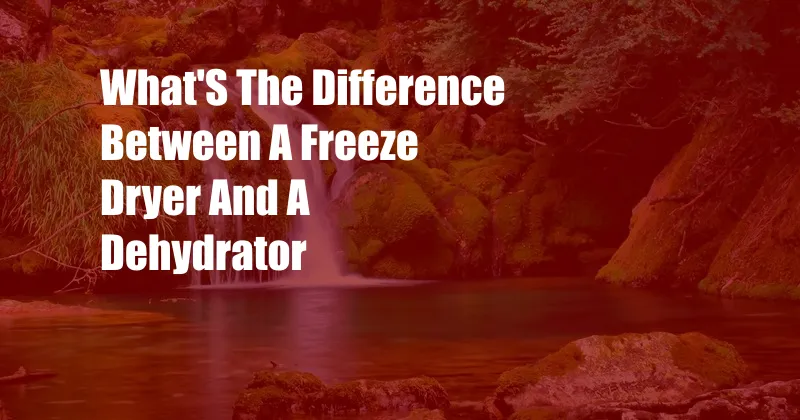
The Difference Between a Freeze Dryer and a Dehydrator
Growing up, my family had an orchard and a garden that provided us with an abundance of fresh fruit and vegetables. My mother was an avid canner and would spend hours preserving our harvest. However, as I got older, I realized that canning was not the only way to preserve food. I discovered freeze drying and dehydration, two methods that offer their own unique benefits.
Whether you are looking to preserve your homegrown produce or simply want to enjoy the convenience of having long-lasting snacks on hand, understanding the difference between freeze drying and dehydration is essential. In this article, we will explore the intricacies of each method, providing you with the information you need to make an informed decision for your preservation needs.
Freeze Drying: The Ultimate Preservation Method
Freeze drying is the process of removing moisture from food by first freezing it and then exposing it to a vacuum that sublimates the ice crystals directly into vapor. This process results in a remarkably well-preserved product that is lightweight, shelf-stable, and retains its original flavor, nutrients, and color.
Freeze drying is particularly well-suited for preserving fruits, vegetables, and meats. The sublimation process locks in the food’s natural flavors and nutrients, making it an excellent choice for creating long-lasting snacks and emergency food supplies. Additionally, freeze-dried food has a long shelf life, making it an ideal option for those who want to preserve food for extended periods.
Dehydration: A Versatile and Budget-Friendly Approach
Dehydration is a more traditional method of preserving food that involves removing moisture by exposing it to warm air. Unlike freeze drying, dehydration does not involve freezing the food first. Instead, it relies on evaporation to remove the moisture, resulting in a product that is lighter and has a longer shelf life than fresh food.
Dehydration is a versatile method that can be used to preserve a wide range of foods, including fruits, vegetables, herbs, and spices. It is also a relatively simple and inexpensive process, making it a popular choice for home cooks and small-scale food producers. Dehydrated foods are a great way to add flavor and nutrition to snacks, meals, and beverages.
Dehydration vs. Freeze Drying: Understanding the Key Differences
While both freeze drying and dehydration are effective methods of food preservation, there are several key differences between the two that make each method better suited for certain applications. Here is a table summarizing the main differences between freeze drying and dehydration:
| Feature | Freeze Drying | Dehydration |
|---|---|---|
| Moisture Removal Method | Sublimation | Evaporation |
| Product Quality | Retains original flavor, nutrients, and color | Flavor and nutrient loss possible |
| Shelf Life | Long shelf life (up to 25 years) | Shorter shelf life (up to 2 years) |
| Cost | Expensive equipment and process | Less expensive equipment and process |
Tips and Expert Advice for Preserving Food
Based on my experience as a food blogger, here are some tips and expert advice for preserving food using freeze drying or dehydration:
-
Choose high-quality produce: The quality of your finished product will depend on the quality of the food you start with. Choose produce that is fresh, ripe, and free of blemishes.
-
Prepare food properly: Before you freeze dry or dehydrate food, it is important to prepare it properly. This includes washing, peeling, and slicing or dicing the food as needed.
-
Follow the manufacturer’s instructions: Each freeze dryer or dehydrator will have its own set of instructions. Be sure to follow these instructions carefully to ensure the best results.
-
Store food properly: Once food has been freeze dried or dehydrated, it is important to store it properly to maintain its quality. Freeze-dried food should be stored in airtight containers in a cool, dark place. Dehydrated food can be stored in airtight containers or vacuum-sealed bags at room temperature.
Conclusion
Whether you choose to freeze dry or dehydrate your food will depend on your specific needs and preferences. Both methods offer their own unique benefits and drawbacks, and it is important to weigh these factors carefully before making a decision. If you are looking for a method that will produce the highest quality product with the longest shelf life, freeze drying is the better choice. However, if you are looking for a more budget-friendly and versatile option, dehydration is a great choice.
Would you like to learn more about freeze drying or dehydration? Let us know in the comments below and we will be happy to provide additional information.